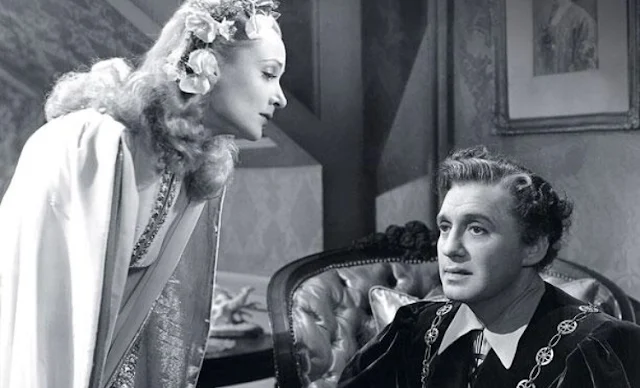 |
| Carole Lombard and Jack Benny in To Be or Not to Be |
Joseph Tura: Jack Benny
Lt. Stanislav Sobinski: Robert Stack
Col. Ehrhardt: Sig Ruman
Greenberg: Felix Bressart
Rawitch: Lionel Atwill
Prof. Siletsky: Stanley Ridges
Director: Ernst Lubitsch
Screenplay: Melchior Lengyel, Edwin Justus Mayer
Cinematography: Rudolph Maté
Production design: Vincent Korda
Film editing: Dorothy Spencer
Music: Werner R. Heymann
Topical humor and satire has always been a risky business, as Kathy Griffin learned recently with her gag involving a severed Trump head. When a joke about current events offends rather than amuses an audience, producing stunned silence or at best nervous laughter, comedians usually try to defuse the situation by asking, "Too soon?" For Ernst Lubitsch's To Be or Not to Be, it was "too soon" for a very long time. Begun before Pearl Harbor and completed after the United States had declared war on Nazi Germany, To Be or Not to Be had the further misfortune to be released shortly after the death of its star, Carole Lombard, in a plane crash while on a tour selling war bonds. The unavoidable bad timing resulted in a critical and commercial failure, with many critics echoing the reaction of the New York Times's Bosley Crowther, admittedly a man not known for his lively sense of humor, that To Be or Not to Be was a "callous and macabre" treatment of "a subject which is far from the realm of fun." Even the father of the film's star, Jack Benny, walked out of the picture when he saw his son wearing a Nazi uniform. (He was later persuaded to sit through the movie and liked it.) Critical nervousness about To Be or Not to Be lingered for a very long time, especially among the generation that fought in or grew up during the war. Andrew Sarris, who placed Lubitsch in his "Pantheon" of great directors in his 1968 book The American Cinema, took notice of the film's reputation as "an inappropriately farcical treatment of Nazi terror," and rather oddly commented, "For Lubitsch, it was sufficient to say that Hitler had bad manners, and no evil was then inconceivable." As late as 1982, in her collection of short reviews, 5001 Night at the Movies, Pauline Kael said that "the burlesque of the Nazis ... is so crudely gleeful that we don't find it funny." That last is, incidentally, a prime example of the Kaelian "we," her tendency to include the reader in her own experience of films. As Sam Goldwyn reportedly said, "Include me out." I'll admit that the first time I saw To Be or Not to Be, I was a little shocked by its tone, and especially its portrayal of the Gestapo as a gaggle of brainless schnooks, epitomized by Sig Ruman's easily duped Col. Ehrhardt. Yes, the Gestapo was a formidable instrument of terror, to the point that they remain emblematic of the utmost viciousness of Nazism, especially when countless movies made after the entrance into the war freed Hollywood filmmakers from their obligation to remain neutral. On the other hand, the Spanish Inquisition was an equally formidable instrument of terror, and is anyone really offended when they turn up as a gag line -- "Nobody expects the Spanish Inquisition" -- in Monty Python sketches? Time allows us to distance ourselves from horror, so today most people acknowledge and admire the skill and wit of Lubitsch's satiric farce, which is also a pretty good spy thriller, with genuinely suspenseful moments. Lombard is at her most poised and glamorous, as well as a surprisingly effective foil for Benny, who as the "great, great Polish actor Joseph Tura" for once in his rather undistinguished career in movies -- which never showcased him as well as radio or TV did -- has a chance to display his perfect comic timing. Tura's reaction -- an indignant slow burn -- when the start of his "To be or not to be" soliloquy cues Lt. Sobinski to leave his seat for an assignation with Mrs. Tura is Benny at his best. But the film is also laced with moments of real awareness of the horrors beneath, an awareness that is not really compromised by being made part of a comedy. The most famous line of the film is probably Ehrhardt's observation, in response to the disguised Tura's request for an evaluation of his work on the stage, "What he did to Shakespeare we are now doing to Poland." How this double entendre made it past the Production Code censors, I don't know, but it's evidence that Lubitsch was certainly aware of the reality and not just being "inappropriately farcical."